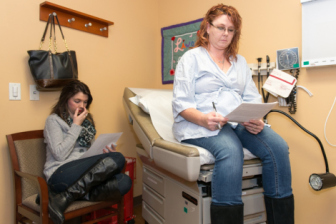Abortion is a word loaded with class implications, political divisiveness, and societal stigma. However, the procedure itself simply refers to the deliberate termination of a pregnancy.
We respect all moral views, and this article is not intended to establish ethics around abortion – it addresses research and misconceptions so you can make the best decision for your individual situation.
Types of Abortions
There are two kinds of abortion procedures: Surgical abortions and medication abortions.
Surgical abortion, also referred to as suction aspiration abortion, involves dilating the cervix and removing the fetus and related pregnancy material through a small suction tube.
The procedure can be performed in one day if less than 14 weeks have passed since your last menstrual period began, and is done in the doctors’ office with oral pain-relieving medications and local anesthesia.
It is sometimes performed on women post-20 weeks of gestation in situations where carrying out the pregnancy may put the mother’s life at risk, or in cases of fetal anomaly.
Medication abortion, also known as “the abortion pill,” can be performed in the early weeks of pregnancy depending on the laws of the state or country.
Medication abortion involves orally ingesting a combination of two medications – misoprostol and mifepristone – to terminate the pregnancy. It is a non-invasive, low-risk procedure that is about 99% effective.
Potential Risks Of Abortion
While it’s important to remember that any medical procedure carries certain risks, such complications are rare. Out of 1 million medical abortions performed in the U.S., 2% had complications (compared to 8% for pregnancy and 12% for wisdom teeth removal). Some potential complications include:
- Perforated uterus
- Infection
- Incomplete abortion
- Heavy bleeding
- Allergic reactions
One way to reduce the risk of potential complications is to get screened for STDs and pre-existing gynecological issues before abortion.
Misconceptions About Abortion
Myth 1: Having an abortion will affect my chances of getting pregnant again in the future.
The majority of women do not experience any issues with fertility after an abortion. In fact, most women can get pregnant immediately following an abortion, so it’s important to use contraception if you don’t want to get pregnant again.
There is a small risk of developing a womb infection, which if not treated quickly, could turn into pelvic inflammatory disease (PID) and spread to your ovaries and fallopian tubes. PID can raise the likelihood of ectopic pregnancy or infertility, but if you go for regular follow-ups and consultations with your medical provider, the infection can be treated before it reaches this stage.
Myth 2: There are always mental health consequences after seeking an abortion.
Over 50 years, large-scale longitudinal and international studies have found that there is no link between obtaining a safe, legal abortion and mental health problems.
In one landmark study of more than 1,000 women across 21 states, women who were allowed to obtain a legal abortion had the same likelihood of reporting negative emotions, mental health symptoms, and suicidal thoughts than women who were denied an abortion.
Myth 3: Abortion is an unsafe procedure.
When performed by a licensed doctor with the proper equipment and facilities, abortion is a safe medical procedure. In fact, it has a lower complication rate than many other common medical procedures like getting your wisdom teeth removed.
Abortion pills are safer than common medications like Tylenol, penicillin, and Viagra. As mentioned above, there are always potential complications, which can be reduced or mitigated through pre-abortion screening, communication with your medical provider, and frequent checkups.
Myth 4: Abortion may increase my chances of getting breast cancer.
The most up-to-date research shows that abortions do not increase the risk of breast cancer. According to Cancer.org, a woman’s risk of developing breast cancer is impacted by the levels of certain hormones in her body, and hormone levels fluctuate throughout a woman’s lifetime (such as during pregnancy and menstrual cycles). Abortions also cause fluctuations in hormone levels, which has led to research around potential correlations of abortion and breast cancer.
However, expert panels convened by the American College of Obstetricians and Gynecologists (ACOG) and the National Cancer Institute (NCI) have concluded that there is no link – a conclusion backed by research and multiple evaluations.
Myth 5: Abortion kills an unborn baby.
In the first trimester (the first three months of pregnancy), a pregnant woman carries an embryo, which develops into a fetus after the end of the second month of gestation. During the first trimester, the embryo or fetus is unable to survive on its own outside of the womb, and it also has not yet developed any senses that would allow it to recognize personhood.
Though moral stances vary, the majority of countries and governing medical institutions in the EU do not recognize the “personhood” of a fetus, and do not equate a pregnancy in the early stages of gestation to a baby.





